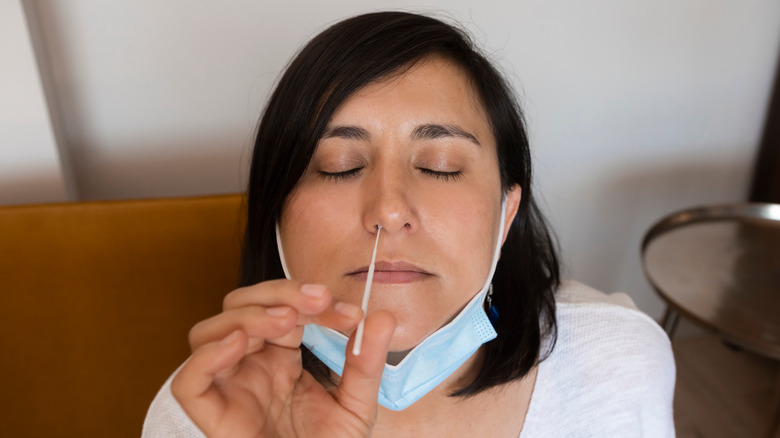How Recent Study Gives A Better Understanding Of COVID-19's Loss Of Smell
Experts are strenuously trying to understand all of the symptoms, side effects, and nuances of COVID-19 with ongoing research into why people diagnosed with coronavirus can have completely different experiences. Luckily, a 2022 study published in Science Translational Medicine has determined why the loss of smell is restored in some patients who have had COVID-19 while others don't have their full smelling capabilities returned to them. The medical terminology for loss of smell is olfactory function loss, and there are three categories used to define a person's capacity to smell, as per a 2020 review article published in Frontiers in Neurology. Normosmia describes full possession of smell, while hyposmia identifies partial loss of smell, and anosmia indicates a complete loss of olfactory function.
Effects on the patients' ability to smell have perplexed experts who have treated those infected with COVID-19 and researchers who have studied the virus, given that some people lose their sense of smell and then regain it, some lose it indefinitely, and others experience a change in their senses and smell things differently post-COVID than they did prior to contracting the virus (per the University of Utah Health). Here's what to keep in mind if you lose your sense of smell.
Damage to nasal tissue can be ongoing after COVID-19
The recent 2022 study was conducted by researchers joining forces from Harvard Medical School, the University of California San Diego, and Duke Health (per Harvard Medical School). The purpose of the study was to identify why some people experience a return to normosmia, or full function, after having COVID-19 while other people experience either partial or complete loss of smell for long periods of time following the virus. Results of the research determined that an immune response within the nose is responsible for olfactory function as the body recovers from COVID-19, and that an inflammatory immune response may limit a person's ability to smell during and after the virus. Ongoing immune responses provoking inflammations in the fragile nasal tissue, called the olfactory epithelium, are believed to damage olfactory sensory neurons that allow a person to smell. The more neurons in nasal tissue that are damaged due to inflammation when a person has COVID-19, the more likely they are to experience a partial or full loss of smell for an indefinite amount of time. During the study, researchers found that immune responses instigating the loss of smell may be ongoing even after a person's body has been rid of the COVID-19 virus.
As research continues into the effects of COVID-19 on the body, so does research into effective treatments. According to the University of Utah Health, potential treatments for loss of smell include intranasal steroid sprays, neuromodulating medications, and olfactory retraining.


